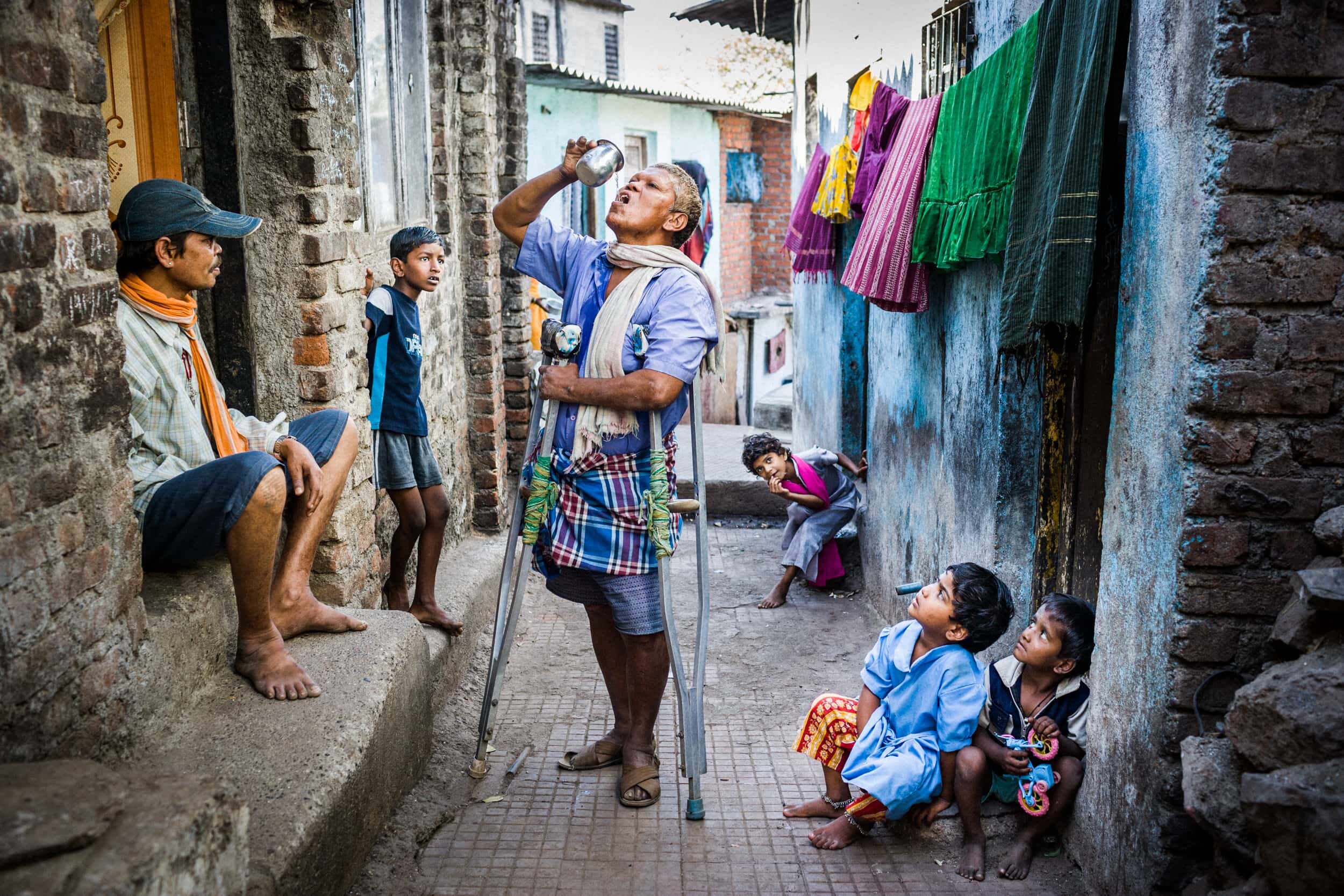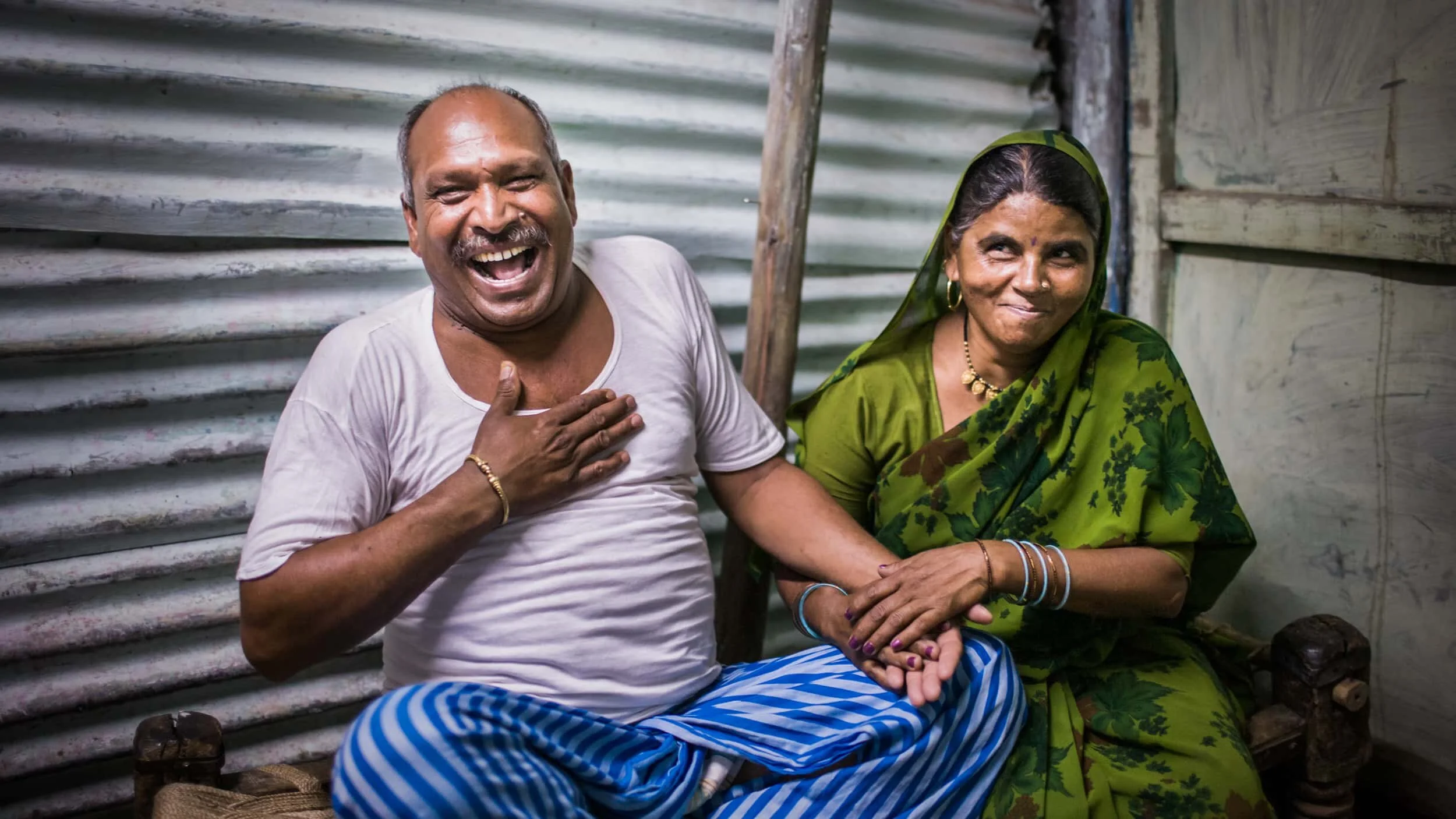
The transformative power of recognition
David Griffiths – Director, Office of the Secretary General at Amnesty International – looks back at the thinking behind Being Untouchable, a campaign he created in a previous role at CSW, to highlight the injustice suffered by many of India's 167 million Dalits.
Facing my front door hangs a photograph of a man with leprosy drinking in the street. It is an unusual and slightly troubling scene, but I like it, for all that it represents.
The man in the picture is not defined by his disease, nor by the deprivation which gave it to him. He is a figure of life and intrigue in a colourful scene which looks so strangely perfect that it could all be staged (it isn’t). It’s a photograph which demands a story, a punchline.
That story, though, is simply the intrinsic dignity of a man treated as a pariah, an outcast in society. It is the story of his need for water, just like mine; of the dexterity of his manner of drinking; of his unexplained command of the attention of all around him as he stands centre-stage.
The photograph was taken by Marcus Perkins. I approached him for this work several years ago after scratching my head about how to find an accessible way to communicate the routines of marginalisation, discrimination and violence suffered by the once-called untouchable people of India, the Dalits.
What I wanted to do was find a way to provoke a sense of solidarity across unbridgeable gulfs of society, culture, language, economy; to urge compassion; and to call for justice.
All the tools that were available seemed inadequate. There were statistics that were hard to get our heads around: that according to the census data we had available at the time, the number of Dalits matched the populations of the UK, France and Spain together. But quantitative data is never enough to make us care. There were nuances and subtleties that defied easy explanation, but needed not to be ignored: we could make no easy correlations between caste and wealth or power.
And then there were the people behind these walls. What could be done to present their stories with authenticity and forge a sense of connectedness to them and their tribulations? So we turned to photography to open some vignettes into the dramatic and the banal ways of how untouchability is experienced. Of course, nothing would have been possible without people opening their lives to us, sharing their stories and their routines; and that would not have been possible without trusted activists and community leaders vouching for us - people who lead the local struggles for change.
Babu Lal is a manual scavenger who cleans the excrement of others, a job assigned to him because of his caste. He and his wife are in the home of his brother. His own home is opposite, but it has no electricity. We were unsure as to whether we could visit Babu and his family in the evening, since many manual scavengers turn to alcohol, as a form of escapism from their work. However, we received a warm welcome and attracted considerable curiosity.
Babu has worked as a manual scavenger for at least 30 years. His father was a manual scavenger before him, working for the Indian railways. Now he hopes that his daughter and three sons can escape from this work through education. Nasik, Maharashtra.
So it was that, lubricated frequently by chai, we set out to create a set of photographs which conveyed the fundamental beauty and dignity in the often terribly sad stories of some of those marked as untouchable.
Jaya's brother was the breadwinner, sweeping the streets of the nearest city. The family would never be rich but they got by ok. For them this was a story of stunted opportunity, living as they did segregated from the rest of the village.
Uma’s job by virtue of birth was to gather up the human excrement from a dry latrine in a village in southern Andhra Pradesh, which she carried in a basket on her head to a dumping ground. Many of the 800,000 who performed this appalling job found themselves unable to eat, often becoming sick and dying very young.
In a bizarre twist of irony, her own home had its own toilet. She was above the indignity foisted upon her.
When the body of work was finished, we called it Being Untouchable. There was the young girl, thrown onto a heap of burning ashes in reprisal for treading on a path reserved for those more socially elevated; the men whose family home had been burned down in caste violence; the community known as rat-eaters for the extremity of their poverty whose daughters would, against all the odds, learn. There were the temple prostitutes, the destitute, the child labourers, the rubbish pickers, the survivors of violence.
Sandeep is a Dalit who has worked as a sweeper since he was eight years old, earning approximately £0.65 per day.
Nasik, Maharashtra.
The resulting exhibition went first to a gallery in Old Street, then to St Paul’s Cathedral, and was featured by the BBC, Guardian, and a bunch of other media. We printed them with a tough laminate which people could run their hands over, repudiating untouchability with touch.
I do not make any great claims for the impact of this work as a piece of advocacy. But we believed that simply to unmask the deep dignity of those suffering daily humiliation and invite the viewer to meet them on an equal footing was a small transformative act, appealing to the basic human instinct for solidarity which can overpower all that separates us.
There are many easy ways to reinforce separation. We are so often prone to language which closes doors. We who do human rights work need to take care to avoid language which distances and objectifies: victims, rights-holders. Nobody, of course, is defined solely by victimhood.
But more than that, if we are not careful, the language we use in conversations, in the media, politics, creeps towards a dehumanising quality, reinforcing otherness and creating categories which become intractable. Perhaps none is more chilling than the words we use for the stranger among us: an illegal, or an alien.
Manasi shows her baby, born in that tent just one week earlier, to her twin sons, Sunta and Namboa, while her ‘neighbour’ Mamata prepares a meal. These women and their families are among several who share a single tent in a displacement camp housing 45 Catholic families, which they have named ‘Shanti Nagar’, or ‘place of peace’.
These families had been accommodated in five separate places since being displaced by the communal violence in August 2008. When the relief camp in which they were accommodated previously was closed, they were told by the authorities that their village was still too hostile for them to return. Instead, they were housed in this cluster of tents, with no regular supply of food and no protection against the threats of more attacks which they continued to receive.
Kandhamal District, Orissa.
Identity is profoundly important. We need categories to define ourselves and our place in the confusing tangle of the world and its history. We need to belong to groups, to classify ourselves and those around us.
But, when we solidify these groups too much, our consequent failure to recognise each other’s humanity is one of the root causes of our injustice towards each other. I think we are all guilty of this. Our need for self-justification leads us to tell exclusionary narratives: I am different from you, therefore superior; we are better than them. Every -ism, racism, sexism, casteism, begins with a claim to superiority and a failure to recognise in the other the commonality of our humanity.
So, as we fight against injustice, how can we pull back the curtain of this delusion? What can we do to move from exclusion to solidarity? How can we recognise the humanity in each other as the starting point in our interaction together, beginning a trajectory of reconciliation rather than rejection?
If my small experiments with a photographer have taught me anything, it is that there is something deeply transformative about recognition: Beginning with a recognition of dignity, of equality, of humanity in the other, we can demand much more of ourselves in confronting the ugliness of the world.
Because what really matters more than to reimagine horror as beauty, to love the one thought unlovable, to touch the one considered untouchable? How are you going to do it?
Two Dalit girls living in a slum area of Bengaluru wash their faces before going to an open air school run by residents of the slum.

Nirmala was widowed just a few weeks before we visited her community. Despite her recent loss, she was adamant that she wanted to be part of this project. As a Dalit, who has also lived with leprosy since the age of eighteen, Nirmala is painfully aware of the double stigma associated with her condition and her caste. Kalyan, Maharashtra.
The kindness of strangers
During the course of the project we regularly experienced acts of kindness and enjoyed the hospitality provided by individuals, families and communities. One particular incident stands out as a reminder of the kindness of strangers, and how these small acts stay with us even though we’re not always sure who helped us at the time.
Whilst working in Andhra Pradesh, we were caught by an unexpectedly heavy downpour causing all manner of problems for the photography. When we were handed an umbrella, such was the focus on continuing the work that little attention was paid to who had provided it.
Only when the pictures were looked at in greater detail in London did we notice the spare umbrella being carried to us by a young girl accompanied by her father. The picture was originally taken spontaneously without any purpose beyond showing the rain.
Sadly we never found out their names, but they belonged to a community of 165 Christian Dalit families. They had settled in this area, just over the state border from Orissa in Andhra Pradesh after having fled the 2008 communal violence in Gajapati district.
A Christian man, purporting to help, sold them poor quality land in the midst of paddy fields, which is liable to flooding, without granting them full rights of ownership. Being outside Orissa, they are not eligible for help from the Gajapati District authorities.
Srikakulam District, Andhra Pradesh.

About CSW
CSW is a human rights organisation who defend, uphold and promote the right to freedom of religion or belief in over 20 countries across Africa, Asia, the Middle East and Latin America.
Headquartered in the UK, their work is rooted in the UN Charter and the Universal Declaration of Human Rights. Through their advocacy, they challenge world leaders to fulfil their duty to protect religious freedom for all.




